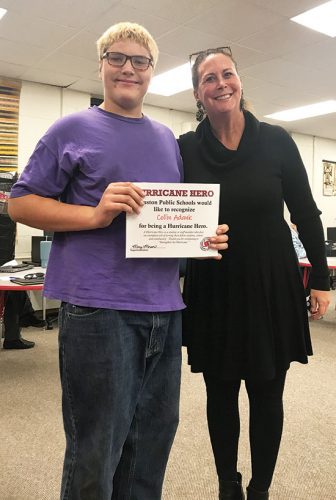
Photo by Wanda Hanson
The Houston School Board held their regular meeting on November 2 and then followed that with a study session to discuss future steps after the failed August referendum vote. Superintendent Mary Morem facilitated the study session, asking the board to answer the following questions: What were we asking for in the referendum? What did we learn from the vote? What are we going to do about it?
What were we asking for on the referendum?
Writing each of their responses on separate sticky notes, the board mentioned a safe entry for the both schools with a high school office at the entry, accessibility with an elevator and updated bathrooms at the elementary, cafeteria updates, CTE space, workspace for online students, collaborative space, weight room, and an auditorium.
What did we learn from the vote?
Josh Norlien shared that he felt the public didn’t want a tax increase; he did, however, feel that there had been a good voter turnout. Both he and Nickki Johnson felt both the board and SiteLogiQ should have gotten the information out to the public sooner.
Arlin Peterson said that if the referendum had been for less money, the public might have supported a project with a smaller scope at this time and perhaps would have supported a future referendum for additional needs. Peterson went on to repeat his comment from before the referendum that he felt it wasn’t good timing because of the recent property tax increase for local residents. He also mentioned that the vast majority of the voters did not have children in the school.
The board acknowledged that the community did agree on the need for safe and secure entrances and accessibility at the elementary.
Norlien pointed out that the public was concerned with the essentials — not frills; they weren’t interested in green spaces. Peterson declared that while people would love an auditorium, they were concerned about the cost of it in their taxes.
Nickki Johnson said that as a new board member, she felt the timeline was rushed. She felt more of the community needed to be involved sooner so the board would have learned more about what the public wanted.
Communication was an issue; flyers didn’t get out to all the residents, social media, school website posts, and the newspapers often went unread. Norlien commented that they had upped communication by holding the referendum. Peterson noted that the community was leery that another referendum would be attempted right away.
What next?
The board came up with some creative ideas for their next steps. Chair Mimi Carlson suggested the possibility of using long-term maintenance funds to improve bathrooms. Working directly with a construction company was suggested as a way to cut costs on projects.
Nickki Johnson offered the idea of reconstructing the media center to make use of it for collaborative space as well as, perhaps, Hurricane Hub. A lunchroom addition at the elementary could provide relief from the lunchtime crowding.
Peterson asked if they HAD to do something; Johnson responded that they did still need to do something about building security.
Principal Michael Mangan shared that the school is taking steps to improve security while focusing on keeping the costs down. Cameras and secure keypad entries are being added at the East Campus and Hurricane Hub. He encouraged the board to think about AP classes and the cramped CTE classrooms.
Mimi Carlson informed the board that the previous goal of the prior board was to have something drawn up for improvements in the event that funding became available from the state.
Mark Swenson, who was absent due to illness, submitted his thoughts in a letter. He asked, “What is the value of updating our school?” He answered that without a school, the community dies and pointed out the many benefits to a small community that a school brings. He encouraged the board to continue to work to improve the school.
Closing the study session, Morem asked for a single word to describe what was needed now. Responses included: creativity, security, priority, safety, collaboration and accessibility.
Regular meeting
During the regular meeting, Collin Adank was recognized as the month’s Hurricane Hero because he always steps up to help others.
Student representatives Julia Carr and Nataleigh Dankers updated the board on Honor Society inductions, and the focus on presenting career options to the high schoolers.
Mangan shared that PLC times on Wednesdays were producing collaboration for the teachers. Elementary students were engaged in academic and enrichment activities at that time.
MNVA Administrators shared the successes of the schools thanks to focusing on student achievements and needs. With the help of ADSIS, additional intervention teachers now work with students at risk. A student leadership team is being created to give input to the administrators. Weekly newsletters provide transparency, ownership, and improve school culture. Morem shared that K-12 pays for tutoring for students not reading well by third grade and continues to offer support to struggling high schoolers until they graduate.
The next Houston School Board meeting will be December 7 at 6 p.m. in the high school media center. The public is welcome to attend.


Leave a Reply